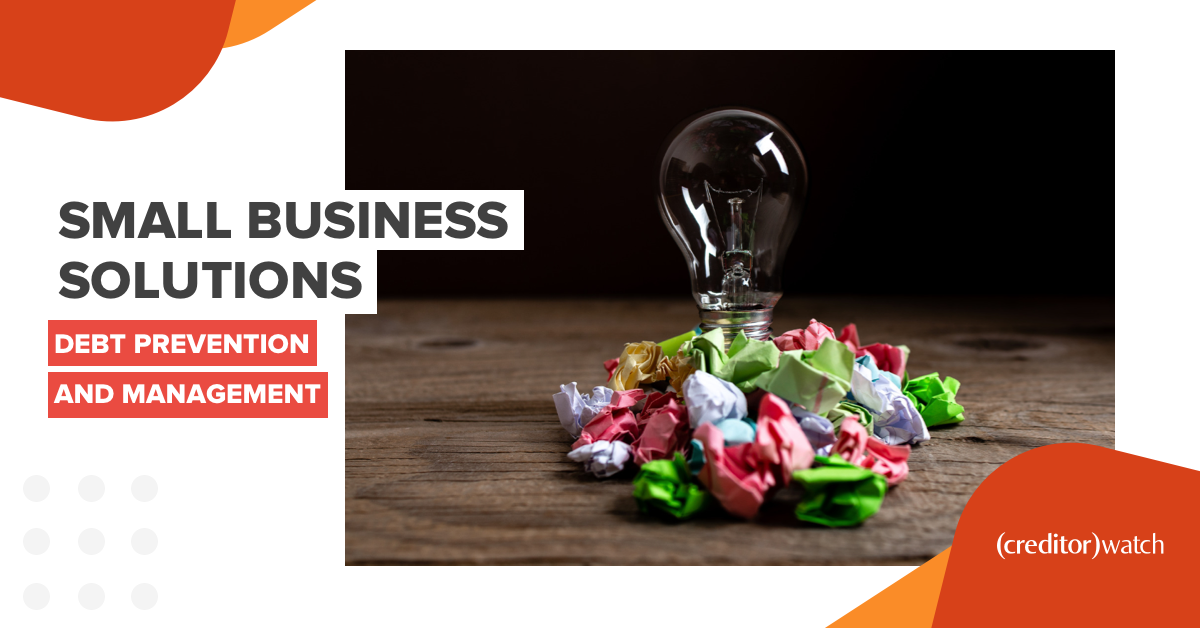Helping small businesses manage cash flow and improve their processes
CreditorWatch was created as a commercial credit bureau for businesses of all sizes, and we’re proud to support a large database of small and medium-sized businesses (SMEs). We teamed up with two Queensland-based business leaders to answer some of the most frequently asked questions we get from small businesses in the lead-up to the End of Financial Year:

She has a passion for helping SMEs grow and is challenging the status quo of the debt collection world to focus on debt prevention and great credit policies to safeguard small businesses.

As partner of Sammut Bulow Bennett Partners, Brad is a driving force in its expansion of its service delivery. His entrepreneurial spirit has seen SBBP evolve from an accounting firm to a full scale wealth creation provider. Brad and his team can help individuals and businesses at any stage of their life cycle achieve success.
What are the most common mistakes small businesses make that affect their cash flow?
Brad:
- Cash flow planning is paramount, and this is an area many small businesses struggle with. Businesses can be affected by seasonal and cyclical trends that need to be addressed before they happen. Having a plan and monitoring the plan daily is key.
- A lot of businesses don’t know how to proactively collect debt and don’t have a proper debt collection process in place.
- Business cash flow planning is also linked to personal cash flow planning. Have a personal budget, plan for your own expenses and don’t be greedy as this can all affect your businesses financial position.
During COVID, we all saw how important it is for businesses to be adaptable and proactive. How do you recommend businesses stay proactive to help prevent cash flow issues?
Angela:
- Since COVID, we’ve been trying to do more with less and adapt to new issues like working remotely, so having access to information and data is hugely important. Automating your processes and getting on board with technology is also important. Programs like Xero and MYOB are vital for business owners as they offer a transparent view of their accounts. Using this information and sitting down with a customer to discuss their payment behaviour can be equally insightful for the customer as well.
- Business owners can also forget that credit is a privilege, not a right, so it’s okay to say no if a client simply isn’t worthy of your loan.
- Don’t set and forget. Issues in business can arise very quickly, so it’s important to stay on top of your customers and monitor for adverse risk so you can act accordingly.
- Make sure your staff are trained and confident in making account follow-up calls, as well as use the right tone, context and have all the right information ready beforehand. For example, provide training in areas such as the ASIC and ACCC’s Debt Collection Guidelines for Creditors and Collectors The Privacy Act 1988, and the National Credit Code.
What are the main ways SMEs can stop this debt occurring in the first place?
Angela:
- Foundational documents, like your credit policy, credit application and terms and conditions, are important and set the basis for creditor-customer relationships. The fine print may not seem important while on-boarding a new customer, but it’s a big part of your collections toolbox and security.
- Understand your customer, their legal trading style, previous payment behaviours, successes and failures in business and manage your risk accordingly.
- Avoid the “protected species”. We need friends and key clients in business, but it’s important to understand that they aren’t your friend or best customer if the relationship isn’t fair and they are trying to take advantage of you.
- Make sure your invoice is right and that it contains all of the necessary information for you to be paid on time (e.g. purchase order number and clear description of the works or goods) and be easy to pay by accepting multiple payment methods. Xero and MYOB both offer secure payment gateways with a simple click from the invoice.
- If you do have to write off an account as a bad debt, make sure you learn from it. Was there something that you could have done sooner or better to avoid the debt? Incorporate those learnings into your policy and procedure.
What is the average amount of bad debt a small business will write off in a year?
Brad:
- A 0.2% bad debt percentage of sales is ideal, 0.3% is good, 0.5% is average, but once you get close to 1%, that’s too high.
- Through my research, I know that once a debt is due, you’re already 5% less likely to collect it. Once another 30 days pass, you’re 10.1% less likely to collect that debt.
- If you’ve left it to 90 days overdue, you’ve got a 69.9% chance of collecting. If two years pass the invoice due date, the likelihood of receiving payment drops to 9.3%.
- This just proves you need to know your customers and watch out for the early warning signs. Be prepared to think on your feet and pivot when you need to, like offer a client a discount for early payment or stop credit altogether if they’re a serial late payer.
At what stage should a small business approach a recoveries agent?
Angela:
- As soon as a client has breached your terms and conditions, you have the opportunity to move the matter forward and start to collect the debt. Terms and conditions also offer some security that you may need to invoke, like a director’s guarantee, caveatable interest or secure your interests under the PPSR.
- If it’s a small account under $1000, I take the stance that “if you don’t ask, you don’t receive”. You can get frustrated and angry, but you also have to ask for that payment, and this is why systemised debt collection processes are so important.
- It’s key to pre-empt bad debt and poor payment behaviour to avoid collecting altogether. Monitoring your debtors is a great way to do this.
What benefits can an accountant provide me if I already use Xero and I’m pretty on-top of my finances?
Brad:
- Accountants can also act as an external CFO. Some business owners are amazing at what they do, but one of their biggest pain points is that they don’t understand numbers, so we can take that burden off them. We pitch ourselves as a ‘financial GP’ that can provide a holistic range of services, including cash flow forecasting, tax planning, business restructuring, and KPI and software system analysis.
- We’re also big advocates of having specialists in our business. SBB Partners have wealth, risk, bookkeeping, lending and HR divisions, marketing/digital as well as strong referral relationships with professionals like real estate agents, surveyors, town planners, and law firms – because we can’t do it all. It’s our role to make sure our clients are talking to the right people.
- Read my blog article on CreditorWatch for more insights on how accountants can add value to small businesses.
For more insights on small business debt prevention and management, watch our webinar with Angela, Brad and George Wolf, CreditorWatch QLD Sales Manager.



